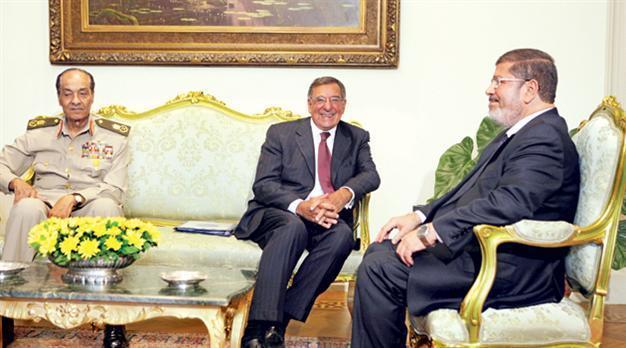Top US official meets new Egyptian head, top general
CAIRO - The Associated Press

Egypt’s newly elected President Mohammed Morsi (R) meets with US Defense Secretary Leon Panetta (C) and leader of Egypt’s military, Field Marshal Tantawi in Cairo. AP photo
U.S. Defense Secretary Leon Panetta has sought assurances from Egypt’s new Islamist government that the country will remain a military partner at a time of political tumult in the Middle East and growing worry about Iran’s nuclear ambitions.
Panetta arrived in Cairo on Tuesday for his first meeting with Egyptian President Mohammed Morsi. Panetta was also meeting with the leader of Egypt’s military Field Marshal Mohammed Hussein Tantawi as the Hürriyet Daily News went to press yesterday evening.
Political uncertainty is casting a shadow over Egypt’s future as the military and the Muslim Brotherhood engage in a power struggle over the future of a country that remains without a permanent constitution, parliament or government.
Panetta told reporters at the start of his week-long trip to North Africa and the Middle East that he would urge Egypt’s government “to provide for as broad a coalition as possible within the government.”
Panetta’s visit comes on the heels of Secretary of State Hillary Rodman Clinton’s earlier visit in July. She was the first member of President Barack Obama’s Cabinet to meet with Morsi since he assumed the presidency in June.
Clinton said in Washington on Monday that the jury was still out on whether Egypt’s Islamist political parties will equally represent non-Muslims. She said the Obama administration’s future relationship with Morsi and the Muslim Brotherhood party would depend on how they respected the rights of Coptic Christians, women and other minorities.
Speaking to the Carnegie Endowment for International Peace, Clinton said Egypt was still grappling with the challenge of religious liberty as it seeks to establish a democracy after decades of dictatorship.
In his talks Tuesday, Panetta was expected to stress U.S. support for the completion of a transition to civilian democratic rule, and to gauge Morsi’s interest in maintaining longstanding U.S.-Egyptian military relations.
Panetta was last in Cairo in October, after the fall of long-time autocrat President Hosni Mubarak and prior to Morsi’s election.
After his Cairo meetings, Panetta will head to Israel for talks with Prime Minister Benjamin Netanyahu, President Shimon Peres and Defense Minister Ehud Barak. A potential Israeli military attack on Iran’s nuclear sites was expected to be a major topic, but Panetta also planned to discuss the progress the Israelis are making on building an air defense system, known as the Iron Dome, which is designed to shoot down short-range rockets and artillery shells.
Panetta arrived in Cairo from Tunisia, where he held talks with the North African country’s new Islamist leaders. He plans to end his trip with a stop on Thursday in Jordan.
The Obama administration publicly backed the revolution that toppled longtime leader Mubarak last year, but also sees the Egyptian army as a crucial regional security partner.
The country is of strategic importance to the United States because of the Suez Canal, a vital conduit for trade and for U.S. military vessels. Washington released $1.3 billion in military aid for Egypt in March despite misgivings over the amount of progress being made toward democracy, saying U.S. national security required continued military assistance.
